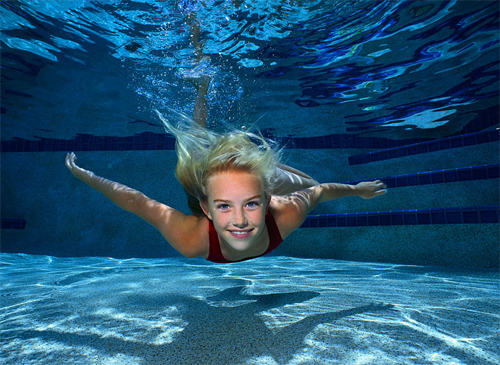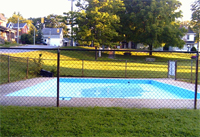Posts Tagged ‘drowning’
Swimming Pool Safety for Families
 Many of us will spend the last few weeks of summer by the pool, with family and friends, at a slower pace. Relax and enjoy it, but also remember you have responsibilities if young children are around the pool. When a child is left unsupervised, tragedies can happen quickly, sometimes within seconds. In fact, a child who is submerged under water can lose consciousness within just two minutes. Within four to six minutes, permanent brain injury can occur.
Many of us will spend the last few weeks of summer by the pool, with family and friends, at a slower pace. Relax and enjoy it, but also remember you have responsibilities if young children are around the pool. When a child is left unsupervised, tragedies can happen quickly, sometimes within seconds. In fact, a child who is submerged under water can lose consciousness within just two minutes. Within four to six minutes, permanent brain injury can occur.
Swimming pool drownings are preventable. If parents, family and friends at the pool work together, you can keep swimming a safe and fun experience for young children.
Our injury attorneys share a few safety reminders:
Watch Young Children. Never leave your child alone in the water or near the water. That includes kiddie pools. At the pool, set aside all distractions: your cell phone, magazines and engaging conversation.
Take a Break from Distraction. If you become distracted or fatigued while watching your child, take a break. Ask them to come out of the pool for a little while.
Swim with your Child. Practice “touch supervision” with young children and keep them within reach at all times. As your child gets older, enroll them in swimming lessons. Make a point to get in the pool with them regularly. You can evaluate their strength as a swimmer best from the water and show them how to handle the water around other children.
Swim with a Buddy. Make sure your child knows they must always swim with someone else.
Lifejackets and Floats. Flotation tubes and rafts are not intended to support your children. To give your child extra protection, explore the U.S. Coast Guard website for information on personal flotation devices.
Lifeguards. At community pools, take note of the lifeguard stations and ask how many lifeguards are on-site. But do not rely on the lifeguards. Watch your own children.
Explain the Safety Rules to Your Child. Explain the rules of pool safety often to your child so they understand your priority is to keep them safe.
Not a Parent? If you are not a parent, listen to what your friends or relatives are telling their children. Be aware of their concerns and try to help create a safe pool environment.
Read More
Pool Guests Swim with Caution

After another long winter here in Massachusetts, many of us are looking forward to some time by the pool. Whether you are a homeowner or a pool guest, take time to consider the rules of safety now so you can enjoy this time of year.
As a homeowner, you have a responsibility to keep your home reasonably safe for your family and your invited guests. If you own a pool, you have additional legal responsibilities to keep the swimming area safe. A safe swimming pool is critically important when children live at home or will be visiting. In fact, one third of all children who die between the ages of one and four are drowning victims in pools and spas, and hundreds more are critically injured.
Massachusetts regulates home swimming pools very closely. Here are some of the legal requirements and some common sense tips for the poolside.
Fencing. The law in Massachusetts requires homeowners to enclose pools with a fence at least four feet tall. It must have a self-closing lock which opens outward from the pool. Homes with a back door that opens onto a pool deck must have a pool alarm.
Diving Boards. Diving into a pool presents the risk of severe personal injury due to head and neck injuries. Diving boards are regulated for their size and height over water, and the water should be at least nine feet deep in the diving area. Shallow areas should be marked to prevent diving board injuries. Many insurance companies will request that your remove your diving board entirely as a safety precaution.
Pool Drains. Ask the pool owner where all the pool drains and suctions are and make sure your child steers clear of them. When a child is pulled into suction, they can become entrapped with a strong force, causing drowning and death. Make sure your child is not wearing any loose hair accessories or a bathing suit with loose straps that could get pulled in. Federal law changed in 2008, requiring public pools to start using drain covers to reduce suction deaths, but private homeowners may not have made the change.
Portable and Inflatable Pools. Though they are much smaller than in-ground pools, portable and inflatable pools can pose serious risks for injury, especially to toddlers.
Pool Slides. Whether it is a fixture or an inflatable, ask yourself if a slide looks like it can support you without tipping over. Ask the homeowner how long they have had the slide and if there have been any problems. In 2006, a woman died in Massachusetts after using a Banzai brand inflatable slide. The now-recalled slide collapsed under her as she slid down. She struck her head and later died.
Watch Children Closely. Give your children your complete attention while they are near the pool. Drowning claims more lives among children ages 1 to 4 than any other cause except birth defects, according to the Centers for Disease Control and Prevention. It is the second leading cause of unintentional injury-related death for children and teens ages 1 to 14. Set aside your cell phone, magazines and other distractions and watch your children. If you are in a group of adults, take turns being the “pool watcher.” Have that person step a few feet away from the conversation and concentrate solely on watching the children.
Poolside Toys. Avoid any toy or equipment that is not meant for use at the pool, including trampolines. Inspect all equipment before use.
Broken Glass. Serious accidents can happen when beer bottles and other glass are used near the pool. Broken glass at the poolside is obviously dangerous, so it makes sense to use only plastic or metal containers near the pool. Glass in the pool is even more dangerous–clear glass simply cannot be seen in the water, and will be a serious hazard to anybody using the pool. If there is broken glass in the pool, the only safe remedy is to drain the pool to sweep it out.
Swimming Pool Accidents Can Be Avoided By Owners’ Safety Steps
 With the warm weather and pool season upon us, we wanted to take a moment to discuss important pool safety precautions to prevent injuries and drowning.
With the warm weather and pool season upon us, we wanted to take a moment to discuss important pool safety precautions to prevent injuries and drowning.
A swimming pool holds many risks for injuries, from defective equipment to unsecured locks. The biggest hazard, of course, is drowning. Drowning is the leading cause of death for young children ages 1 to 4 in the U.S. and the fifth leading cause of unintentional injury death for people of all ages. In children under 15, non-fatal drowning is more common than drowning. Non-fatal drowning happens when the brain loses oxygen due to submersion. This can cause brain damage and long-term disabilities.
In many cases, drowning and other pool-side injuries can be prevented if everyone using your pool is closely monitored at all times and your equipment complies with safety guidelines. The Boston personal injury lawyers at Breakstone, White & Gluck share these tips for pool owners:
Fencing. Residential pools must be secured by a fence at least four-feet tall. More than half of all swimming pool drownings among young children could be prevented by four-sided fencing that separates the pool from the house and yard. The fence should have self-closing and self-latching gates that open outward.
If your house serves as a fourth side of a fence around a pool, install door alarms and always use them.
Pool Alarms. Install pool and gate alarms to alert you when children go near your pool.
Drain Entrapments. Keep children away from drains, pipes and other openings to avoid entrapments. Purchase drain covers that comply with the Virginia Graeme Baker Pool & Spa Safety Act. The federal law covers pools which are open to the public, apartment complexes and hotels, but you can purchase these covers for your residential pool. Ask your local pool supplier or visit PoolSafely.gov.
Diving Boards. Never install a diving board for an above-ground pool. If you install one on your in-ground pool, make sure the water is at least 10 to 12 feet deep. Diving is a leading cause of neck and spinal cord injuries. Check with your insurance agent or insurance broker to see if any special precautions are required under your homeowners insurance policy.
Pool Inspection. Call your pool dealer or local board of health and ask for the name of a pool safety inspector.
Telephone. Always keep a telephone outside near the pool in case of emergency.
Glass. Never allow glass in or near the pool. Broken glass is dangerous in the area around the pool, but even more dangerous in the pool itself where it can be completely invisible. We know from the cases that we have handled that broken glass in a pool can lead to serious personal injuries.
Watch Children Swim. Always make sure someone is watching children swim. Assign at least one adult to the task of watching the children.
Read More

